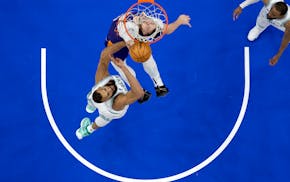DeAndre Mathieu's impact with the Gophers led to reflection on the history of junior college transfers with this basketball team. Several prominent JUCOs were mentioned in a Star Tribune blog, with the covenant that there were probably some prominent players missing from the list.
As it turned out, the forgotten included Ollie Shannon, not the best of the JUCOs but perhaps the most interesting.
In today's game, Shannon would be referred to as a "volume scorer," a generous label. Back in his two seasons at Minnesota, from 1969 to 1971, we looked at Ollie as the ultimate "gunner."
Shannon had been a prolific scorer in New York City, finishing his high school days at the famed Erasmus Hall in Brooklyn. There was one item lacking from his résumé: a high school diploma.
This was discovered after he arrived at Cameron Junior College in Texas. His enrollment there had been arranged by North Texas State.
The lack of diploma meant Shannon couldn't play, so he played pickup basketball and went to night school. He ran into Jerry Kindall, then a Gophers baseball assistant, at a gathering for Christian athletes.
Kindall told Ollie to consider Minnesota. Shannon came to Minneapolis and enrolled at Metropolitan Junior College. This later would become Minneapolis Community College.
Shannon had 70 points in one game for Metro. It still stood as a school record when the program was shut down four years ago.
Ollie was lined up to play for the Gophers. Bill Fitch was the coach and his team had weapons beyond Shannon. Larry Mikan and Larry Overskei were a couple of senior standouts and that team and Ollie had to use some restraint with his mad shooting.
He did lead the team in scoring at 18.9 points per game. The highlight of a season in which the Gophers finished 13-11 and 7-7 in the Big Ten came early at Williams Arena. The Gophers took the dynastic UCLA Bruins into overtime before losing 72-71.
Fitch left after the season to become the coach of the expansion Cleveland Cavaliers. The Gophers kicked around candidates and then decided to give the job to assistant George Hanson.
Shannon was turned loose under Hanson. He scored 26 apiece in nonconference games against Bradley and Marquette.
There were questions being raised about Hanson's ability to discipline his team, particularly Shannon. He decided to suspend Shannon for missing a practice without a proper excuse, and Ollie missed another with an injury.
Today, we would never have found out that Shannon had missed a practice. He might not have started, for an unspecified reason, and then life would have gone on.
Back then, the media and the fans were such stuffed shirts — so into the idea that the coach was a ruler and players were subservient — that missing a practice caused Shannon to become a controversial character with the public.
The Big Ten started and Ollie was putting up 24, 26, 27 points, and the Gophers were losing. Finally, Shannon had 26 in a 97-86 victory over Michigan State, and kept putting up his points.
The Gophers were 4-8 in the Big Ten and 10-12 overall going into Shannon's last game at Williams Arena on March 7, 1971.
"I wanted to look good for the people in my last game here," Shannon said after the game. "I wanted to leave doing something. My main motivation was that I never felt like I had done here what I was capable of doing."
Shannon did something that night in front of a crowd of 8,032 inside the Barn. He scored 42 points, which tied the Gophers' record.
Ollie did that by making 17 of a school record 42 shots. That's not a typo. Ollie took 42 shots. That was not alone among school records:
The Gophers took 108 shots (again, not a typo). They had 69 rebounds. They also went over 100,000 in home attendance for the first time in five years … largely because of customers who wanted to see Ollie fire and fall back.
The final was 104-98 for the Gophers. There was no three-point shot and no shot clock.
Wisconsin took 85 shots that night. That's a total of 193 shots for two teams in 40 minutes of play. It was an outrageous example of the style of the day — race to the other end of the court and get up anything that resembled an open shot.
Shannon went back East, settled in Fairfield, Conn., and did some coaching. He died of pancreatic cancer in 2001, at age 53. And you couldn't refer to the JUCO history of the Gophers without a remembrance of Ollie Shannon.
Patrick Reusse can be heard 3-6 p.m. weekdays on AM-1500. • preusse@startribune.com

Souhan: Wolves fans made Game 1 something special. Now bring on Game 2.

Will Wolves show best-in-the-NBA defensive form in Game 2?
NFL draft has been on tour for a decade and the next stop is Detroit, giving it a shot in spotlight

Former Totino-Grace star set to follow father as first-round pick

